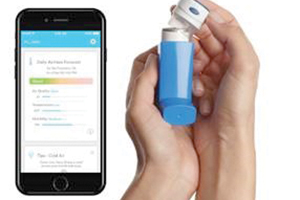Medication dispenser alerts patients to missed dosage
By BETSY TAYLOR
To better help patients manage their asthma, Dignity Health has teamed up with Madison, Wis.-based Propeller Health, which has designed a technology system that reminds patients to take their medicine, tracks when they turn to rescue inhalers and signals a care provider to intervene to get someone needed treatment in advance of a predicted emergency health care visit.
Commonly, an asthma patient will use two inhalers, one for everyday control of symptoms and one to administer a short-acting bronchodilator, referred to as a rescue inhaler. Propeller Health created digital sensors that attach to a patient's inhalers and use wireless technology to record and transmit data when a person takes a prescribed daily dose of medicine, and when the patient turns to their rescue inhaler.

Propeller Health provides sensors that attach to inhalers to track medication use. A corresponding app helps people manage their symptoms and identify their triggers.
Courtesy of Propeller Health
This data is gathered at a clinical call center and analyzed to predict when a patient may be at risk for an emergency department visit or hospitalization, said Dr. Shez Partovi, Dignity Health's chief digital officer and senior vice president of digital transformation. "The heart of the matter is to predict an impending emergency department visit or hospitalization and to intervene."
Based on data gathered, a patient can receive a call from a care provider at a clinical call center or a doctor's office. The clinician may offer asthma management coaching by phone or recommend that the patient make an in-person visit to their doctor or clinic. The clinical call centers are operated in some places by Dignity Health, and in others by Propeller Health, with variations depending on local health care staffing, practice models and need.
When a patient uses the rescue inhaler, a phone app will ask the patient some questions, and gather weather and environmental data such as temperature, humidity and the pollen count from the person's zip code, to create a more detailed account of the individual's environmental asthma triggers, said Chris Hogg, Propeller Health's chief commercial officer.
Partovi added, "Over time, it can give you your own asthma forecast." For example, a patient may wake up on a Tuesday morning a week after using a rescue inhaler to an alert advising against jogging that day, because environmental conditions are so similar to the last time the individual had a flare-up, he said.
Children with asthma also can use the technology. Patients who don't have smartphones can use a wireless hub that plugs into an outlet to collect data from the sensors and transmit their data.
Dignity Health and Propeller Health have worked together on multiple studies to gauge the effectiveness of the technology and its usefulness. Partovi said Dr. Rajan Merchant, a Dignity Health physician, spearheaded this work. Propeller Health refined the technology based on that research.
Dignity Health began using the technology in Sacramento, Calif., and is currently seeding a program to use it in all its eight markets in
22 states, Partovi said.
A study published last year in the European Respiratory Journal that involved Dignity Health patients said that data from 507 asthma patients from July 2011 to September 2016, showed a 79 percent reduction in their hospitalizations after beginning use of the technology, a 57 percent reduction in emergency department visits and a 41 percent increase in their office visits after they started using it. Partovi said the increase in office visits showed that more patients were treated in a setting with the appropriate level of care, likely due to a higher level of health management of their cases.
Dignity Health primarily identifies patients it thinks would benefit from the use of Propeller Health's digital therapeutics in two ways. A patient's doctor can prescribe use of the technology, or in some regions, Dignity Health mines patient data to identify patients who might benefit from the technology and asks them to self-enroll. Enrolling to use the technology does not add any out-of-pocket expense for patients, said Partovi.
Propeller Health said it has worked with 30,000 patients internationally who have respiratory illness. While early work with Dignity Health focused on asthma cases, the technology is also in use with patients who take inhaler-dispensed medication to manage chronic obstructive pulmonary disease.
Dignity Health noted that the use of these digital therapeutics is part of its overall strategy that includes employing technology to improve access, convenience, quality and cost of care.
Hogg touched upon one way that technology is changing care when he explained that the Propeller Health sensors can be programmed to know when a patient is supposed to take a maintenance dose of medicine and will chime 15 minutes later, if a person misses the dose. "Your medicine will actually alert you itself that it's supposed to be taken," he said.
Copyright © 2018 by the Catholic Health Association
of the United States
For reprint permission, contact Betty Crosby or call (314) 253-3490.